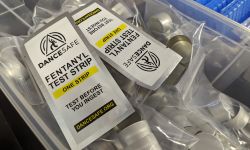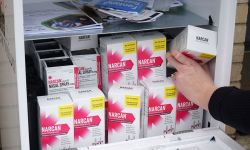Ingham County adds naloxone vending machine to combat opioid overdoses
- Naloxone is an emergency drug used to reverse opioid overdoses
- Ingham County and others are placing the drug in vending machines as the opioid epidemic continues
- Last year, nearly 3,000 died of drug overdoses in Michigan
Ingham County is doing its part to help expand access to naloxone, a life-saving drug that can reverse opioid overdoses during emergencies.
A vending machine containing free naloxone and first-aid kits was placed in the county’s Human Services Building last month. The machine also dispenses other free products such as CPR mouth shields and fentanyl test strips, which can detect the drug blamed for an increase in overdoses.
The vending machine is one of more than 30 containing naloxone located across the state.
Related:
- Lifesaving Narcan for drug overdoses approved for over the counter sale
- ‘Staggering’ rise in overdoses, suicides for African Americans in Michigan
“We are committed to doing everything we can to prevent overdose fatalities,” said Dr. Nike Shoyinka, medical health officer for Ingham County in a news release.
“The installation of this naloxone and first-aid vending machine is one way we are making it easier for people to access the life-saving tools they need.”
Opioids such as oxycodone (OxyContin), hydrocodone (Vicodin), morphine, and codeine and synthetic fentanyl account for nearly 47,000 deaths each year nationwide.
In Michigan, overall drug overdose deaths fell 4 percent last year to 2,993. That's more than double the number of people who died in car crashes in Michigan last year, 1,123.
Nationwide, some 80 percent of overdoses involve opioids, and life-saving actions were present in 60 percent of drug overdose cases, according to the U.S. Centers for Disease Control and Prevention.
“If we are able to increase access to naloxone and have people be equipped to administer naloxone in the event of an overdose, the better we'll be in reducing … the effect the opioid epidemic has in Michigan as well as nationally,” said Gina Dahlem, U-M clinical associate professor of nursing who works with Opioid Prescribing Engagement Network statewide initiative.
The Ingham County effort follows work by Wayne State University to place naloxone kits in county jails across the state.
Critics have argued that expanding access to the kits may enable users to continue abusing opioids. Some also argue that naloxone itself is an addictive drug.
Advocates point to studies that found expanding access to naloxone does not encourage users to use more or riskier opioids.
“Naloxone availability does not increase people's drug use,” Dahlem said. “Naloxone does not enable a person's drug use. It only enables the person who's overdosing to breathe.”
The University of Michigan is taking a different approach. Its Opioid Research Institute and Opioid Prescribing Engagement Network have partnered with Zingerman’s Roadhouse in Ann Arbor, to provide training to the restaurant staff on how to administer the drug.
Opioid Prescribing Engagement Network provides partners with law enforcement to train first responders. This is the first time training will be provided to a restaurant.
"Ensuring our communities have access to lifesaving measures in times of crises is paramount when discussing effective strategies to address the opioid epidemic," Dahlem said.
The training is voluntary, but participants have to be certified in first aid and other lifesaving skills.
See what new members are saying about why they donated to Bridge Michigan:
- “In order for this information to be accurate and unbiased it must be underwritten by its readers, not by special interests.” - Larry S.
- “Not many other media sources report on the topics Bridge does.” - Susan B.
- “Your journalism is outstanding and rare these days.” - Mark S.
If you want to ensure the future of nonpartisan, nonprofit Michigan journalism, please become a member today. You, too, will be asked why you donated and maybe we'll feature your quote next time!








